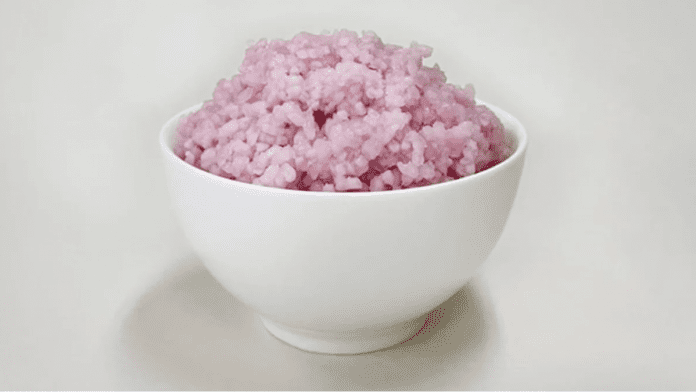News in brief:
– South Korean scientists create meaty rice, a lab-grown grain infused with beef cells, offering a sustainable meat alternative.
– The innovative rice boasts increased protein and fat content, a smaller carbon footprint compared to beef production, and a potential cost-effective solution for consumers.
South Korean scientists from Seoul’s Yonsei University have created a sustainable hybrid food â “meaty” rice with potential global implications. This innovative grain, enriched with beef muscle and fat cells, holds promise in addressing food crises and climate change.
The rice, cultivated in a lab, presents itself in a vibrant pink hue, a result of its infusion with beef cells. This breakthrough could pave the way for a more affordable and eco-friendly meat alternative, contributing to a reduced carbon footprint, according to a news report on the study.

Innovative cultivation process
The rice grains were meticulously coated in fish gelatin, facilitating the adhesion of beef cells to the rice. Left to culture for up to 11 days in a Petri dish, the final product boasted an impressive 8% increase in protein and 7% more fat compared to regular rice. The hybrid rice also exhibited a more robust and brittle texture than its natural counterparts.
Co-author of the study, Park So-hyeon, envisions a future where essential nutrients are derived from cell-cultured protein rice. By incorporating livestock cells into rice, the nutritional content is elevated, offering a novel approach to sustainable nutrition.
Advantages of meaty rice
One of the standout features of this creation is its significantly smaller carbon footprint. The production process eliminates the need for traditional animal farming, a resource-intensive practice contributing to greenhouse gas emissions. The hybrid rice, estimated to release under 6.27 kilograms of carbon dioxide per 100g of protein, outshines beef production, which releases eight times more.
If brought to the market, hybrid rice could provide a cost-effective option for consumers in Korea. With an estimated cost of around $2.23 per kilo, it presents a compelling alternative to traditional beef, which is priced at approximately US$15.



